

How to Practice Self Care: 14 Steps. 1Put your own needs first.
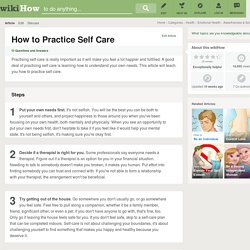
It's not selfish. You will be the best you can be both to yourself and others, and project happiness to those around you when you've been focusing on your own health, both mentally and physically. When you see an opportunity to put your own needs first, don't hesitate to take it if you feel like it would help your mental state. It's not being selfish, it's making sure you're okay first. 2Decide if a therapist is right for you. Some professionals say everyone needs a therapist. Crying: 19 Weird Reasons You Get Emotional. Sometimes you know you're going to cry (The Fault in Our Stars, anyone?)

, but there are other times when you're just doing your thing and—wham! —you're sobbing in the middle of the gym because... endorphins? Yet, we've all been there, someplace completely weird, ambushed by a surprise weepfest. One woman explained it like this to TIME: “I can’t cry at work. I’m not emotionally distraught enough to cry in the shower. 1. 2. 3. What do my dreams mean? From sex with a stranger to chilling with celebrities, falling, being chased, drowning and being trapped. Scientists and psychologists are baffled by a new study which claims the moon can have a profound affect on our dreams.

Morality. Allegory with a portrait of a Venetian senator (Allegory of the morality of earthly things), attributed to Tintoretto, 1585 Morality (from the Latin moralitas "manner, character, proper behavior") is the differentiation of intentions, decisions, and actions between those that are "good" (or right) and those that are "bad" (or wrong).
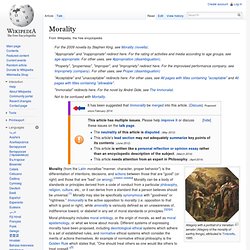
[citation needed] Morality can be a body of standards or principles derived from a code of conduct from a particular philosophy, religion, culture, etc., or it can derive from a standard that a person believes should be universal.[1] Morality may also be specifically synonymous with "goodness" or "rightness. " Immorality is the active opposition to morality (i.e. opposition to that which is good or right), while amorality is variously defined as an unawareness of, indifference toward, or disbelief in any set of moral standards or principles.[2][3][4] Philosophy[edit] Physical attractiveness. Venus de Milo at the Louvre has been described as a "classical vision of beauty".[1][2][3] However, one expert claimed her "almost matronly" "representation" was meant to convey an "impressive appearance" rather than "ideal female beauty".[4] Ishtar, Mesopotamian goddess of sexual love and war.
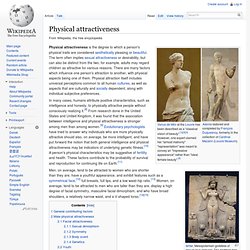
The goddess has been associated with sexuality, love, and fertility.[5][6][7] Physical attractiveness is the degree to which a person's physical traits are considered aesthetically pleasing or beautiful. The term often implies sexual attractiveness or desirability, but can also be distinct from the two; for example, adults may regard children as attractive for various reasons. There are many factors which influence one person's attraction to another, with physical aspects being one of them. Dyslexia Resources. The Neuroscience of Emotions. Can people unlearn their naked shame? One of the experiments carried out for BBC's Horizon programme looked at people's preferences for hairy or hairless bodies Once we were all happy to walk around naked, now we're not.

But can an experiment in nudity help us understand why we are so embarrassed by being seen in the buff and help shed our inhibitions? It's a classic anxiety nightmare - you're standing in front of a room full of work colleagues, your boss is there, maybe even that new colleague you've been trying to impress. Psychology. Psychology is an academic and applied discipline that involves the scientific study of mental functions and behaviors.[1][2] Psychology has the immediate goal of understanding individuals and groups by both establishing general principles and researching specific cases,[3][4] and by many accounts it ultimately aims to benefit society.[5][6] In this field, a professional practitioner or researcher is called a psychologist and can be classified as a social, behavioral, or cognitive scientist.
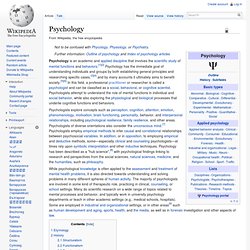
Psychologists attempt to understand the role of mental functions in individual and social behavior, while also exploring the physiological and biological processes that underlie cognitive functions and behaviors. While psychological knowledge is often applied to the assessment and treatment of mental health problems, it is also directed towards understanding and solving problems in many different spheres of human activity. Etymology History Structuralism Functionalism Psychoanalysis. BPS Research Digest. Psychological/ Interpersonal. Eric H. Chudler. Eric H.
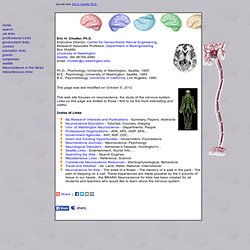
Chudler, Ph.D. Executive Director, Center for Sensorimotor Neural Engineering; Research Associate Professor, Department of Bioengineering Box 354880 University of WashingtonSeattle, WA 98195-4880 email: chudler@u.washington.edu. Cognitive Daily. BrainMysteries.com - Brain Mysteries. Discovery Health "How Your Brain Works" Creativity. Creativity is a phenomenon whereby something new and somehow valuable is formed, such as an idea, a scientific theory, an invention, a literary work, a painting, a musical composition, a joke, etc.
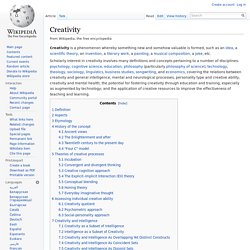
Scholarly interest in creativity involves many definitions and concepts pertaining to a number of disciplines: psychology, cognitive science, education, philosophy (particularly philosophy of science), technology, theology, sociology, linguistics, business studies, songwriting, and economics, covering the relations between creativity and general intelligence, mental and neurological processes, personality type and creative ability, creativity and mental health; the potential for fostering creativity through education and training, especially as augmented by technology; and the application of creative resources to improve the effectiveness of teaching and learning.
Self-Reports. How to detect lies - body language, reactions, speech patterns. Interesting Info -> Lying Index -> How to Detect Lies Become a Human Lie Detector (Part 1) Warning: sometimes ignorance is bliss.

Dyslexia. Dyslexia, or developmental reading disorder,[1] is characterized by difficulty with learning to read fluently and with accurate comprehension despite normal or above-average intelligence.[2][3][4] This includes difficulty with phonological awareness, phonological decoding, processing speed, orthographic coding, auditory short-term memory, language skills/verbal comprehension, and/or rapid naming.[5][6][7] Dyslexia is the most common learning difficulty[8] and most recognized reading disorder. There are other reading difficulties that are unrelated to dyslexia.
Classification[edit] Developmental dyspraxia. Developmental coordination disorder (DCD)[1][2][3][4][5] also known as developmental dyspraxia and clumsy child syndrome[6][7][8][9][10] is a chronic neurological disorder beginning in childhood that can affect planning of movements and co-ordination as a result of brain messages not being accurately transmitted to the body. Up to 50% of those with Attention deficit hyperactivity disorder (ADHD) also have DCD.[6][11] It may be diagnosed in the absence of other motor or sensory impairments like cerebral palsy,[12] muscular dystrophy,[6] multiple sclerosis or Parkinson's disease.
Classification[edit] Developmental coordination disorder is classified in the fifth revision of the Diagnostic and Statistical Manual of Mental Disorders (DSM-5) as a motor disorder, in the category of neurodevelopmental disorders.[13] Your Amazing Brain. Psychology. Psychology Wiki. Brain Explorer. Neuroscience For Kids. The smell of a flower - The memory of a walk in the park - The pain of stepping on a nail. These experiences are made possible by the 3 pounds of tissue in our heads...the BRAIN!! Neuroscience for Kids has been created for all students and teachers who would like to learn about the nervous system.
The Whole Brain Atlas. Essential Life Skills for Personal Development and Growth. In other words. Authority. Psychology. Psychology.... but why did the chicken cross the road? Theories and Observations. Agree Ability. Psych. To Read - Understanding People. Manipulation. Anxiety. Applied psychology. Psychology. Psychology. Psychology. Psychology. Psychology. Mental Health. Psychology. Manipulation and Persuasion. Why Do People Dream - Free Sites to Analyze Dreams. Do you like to find hidden meanings in your dreams?
Do you ever wonder why do people dream? Would you like to control your dreams? We spend one-third of our lives sleeping and most of it dreaming. Many people perceive dreams to be important because: Dreams are important for our overall well-being and health. A lot of information about understanding why people dream, and analyzing your own dreams, is now easily available on the web. Remember Your Dreams The first step is to sleep well. WikiHow provides a 10-Step guide and some tips to remembering dreamsReader’s Digest offers 7 ways for better dream recallTips and resources from an expert to increase dream awareness and recall This should get you started, but remember to be patient and persistent. Search Online Dream Dictionaries If you don’t want to sign-up anywhere but simply want some quick clues to interpret a dream, use online dream dictionaries.
The Constructive Curmudgeon. White Papers - DYSKE.COM. Psychology. More Alive with Color: Personal. Far Beyond The Stars - Live a Minimalist Lifestyle and Work from Anywhere. Take The Initiative and Create Your Own Projects - Smashing Magazine. Advertisement During my last job with a large corporation, people started to get laid off. Many fellow creatives came to me, as they had no idea what they would do if they were let go. I had come to that small city from New York and my experience was varied and impressive to those who started their careers with this company. Their parents had hoped for their own children to work there and eventually retire in the same homey place.
They were anchored in this town that held no other industries. “You’re creative,” I would tell people before my turn came in the next to last round of layoffs (which is some comfort). Take The Initiative! Tailor (A) gives creative (B) a snappy new “power suit”, SO irresistible that the client (C) hugs the suit (D) causing it to hit paddle (E), smashing expensive vase (G) and wasting a perfectly goof head of cabbage (I). Naked, Embarrassed, and Exposed? Self-esteem.